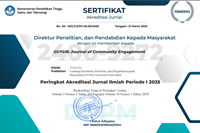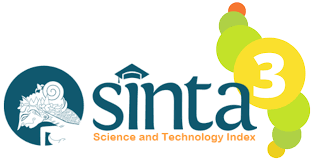Implementasi Teknologi Content Delivery Network (CDN) Sebagai Akselerasi Digitalisasi Sekolah
(1) Nana Rachmana Syambas (Institut Teknologi Bandung)
Indonesia
(2) Syaiful Ahdan (Universitas Teknokrat Indonesia)
Indonesia
(3) * Eki Ahmad Zaki Hamidi
 (UIN Sunan Gunung Djati Bandung)
(UIN Sunan Gunung Djati Bandung) Indonesia
(4) Ridha Muldina Negara (Telkom University)
Indonesia
(5) Ratna Mayasari (Telkom University)
Indonesia
(6) Ade Nurhayati (Telkom University)
Indonesia
(7) Galih Nugraha Nurkahfi (Badan Riset dan Inovasi Nasional)
Indonesia
(8) Jupriyadi Jupriyadi (Universitas Teknokrat Indonesia)
Indonesia
(9) Adi Sucipto (Universitas Teknokrat Indonesia)
Indonesia
(10) Hasan Nur Arifin (Institut Teknologi Bandung)
Indonesia
(11) Rohmat Tulloh (Telkom University)
Indonesia
(*) Corresponding Author
AbstractAbstract. This community service program aims to accelerate the digitalization of education in Pesisir Barat Regency, Lampung Province, through the implementation of Content Delivery Network (CDN) technology using Starlink services and the Learning Management System (LMS) Moodle. The 3T areas (frontier, outermost, and underdeveloped) in this region face infrastructure challenges that hinder stable and fast internet access, which is crucial to support technology-based learning processes. This program involves the installation of network devices, such as Starlink for stable internet access, gigabit switches, and the integration of the Moodle-based e-learning system. Additionally, intensive training is provided to teachers, administrators, and students on using Moodle as a digital learning platform and managing technology-based educational content. The program's success is measured through several parameters, including internet stability and speed, the improvement of digital skills among teachers and students, and the adoption and utilization rates of LMS Moodle in the learning process. Speed test results show a significant improvement. Survey results indicate a substantial impact on teachers' digital literacy. Based on questionnaires distributed to a total of 30 training participants, 60% (18 participants) reported being very satisfied with the alignment of the training materials with their needs. Regarding the delivery of the materials, 63.33% (19 participants) were very satisfied, 26.67% (8 participants) were satisfied, 6.66% (2 participants) were neutral, and 3.33% (1 participant) were very dissatisfied. Direct observation during the implementation showed that teachers could effectively utilize Moodle LMS to manage digital classes. They were trained to create and organize teaching materials, assign tasks, and monitor student progress. This evaluation also highlights the potential for replicating and sustaining the program in other schools within similar regions. Through this evaluation approach, the program is expected to have a tangible impact on improving the quality of learning, expanding digital access, and serving as a model for implementation in other 3T areas across Indonesia. |
Keywords
Full Text: PDF
Refbacks
- There are currently no refbacks.
Copyright (c) 2025 Eki Ahmad Zaki Hamidi

This work is licensed under a Creative Commons Attribution-ShareAlike 4.0 International License.
This journal is licensed under

Creative Commons Attribution-ShareAlike 4.0 International License.








.png)
